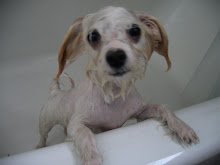Preventing Cancer In Dogs - Cancer The #1 Killer
Did you know that cancer is one of the most common causes of death in pets? Over 50% of dogs over the age of 10 will develop cancer. And the sad thing is that most medical treatments do not work.
What are the signs of cancer? A firm lump that grows and does not go away. Some dogs have an increased appetite but continue to lose weight. Others have respiratory problems and may show overall weakness if they are becoming anemic.
The exact causes of cancer are unclear. Certainly there is a genetic correlation as we are seeing an increased incidence in certain breeds. Golden Retrievers are now the number one breed to be diagnosed with cancer. Boxers are a close second.
We can blame some of it on the environment with exposure to smog, herbicides, and insecticides being contributing factors. Food is of utmost importance - preservatives and other chemical additives may also cause cancer.
What your dog is eating, could be the most important thing that you can do to prevent cancer in your pet!! When the body is supported with the building blocks needed to maintain healthy cells and repair damaged ones, healing from within can begin.
It is best to feed a premium quality holistic diet - avoid artificial colors. Ensure that a natural preservative is used. Some dogs thrive on a raw food diet- if you take the proper precautions, then this is a great option. Cancer cells thrive on carbohydrates and proteins, but can't grow as fast with fats.
Here's an example of a good Cancer Diet: 50% chicken/fish, 50% mixed vegetables, 1/2 tsp of olive oil per 10 lbs, salt and garlic to taste. The next most important thing, is to supplement your pet's diet. The omega 3 essential fatty acids should be added to EVERY pet's diet. FATTY ACIDS ARE ESSENTIAL. Flax is the best source for dogs.
Antioxidants have also been shown to slow the growth and spread of some types of cancer. Vitamin C, Vitamin E and Selenium are the most effective ones. So don't allow your pet to go without them as well.
Veterinary Secrets Revealed
Anything To Do With Dogs!!
puphealth@gmail.com
Preventing Cancer In Dogs - Cancer The #1 Killer
Subscribe to:
Post Comments (Atom)


No comments:
Post a Comment